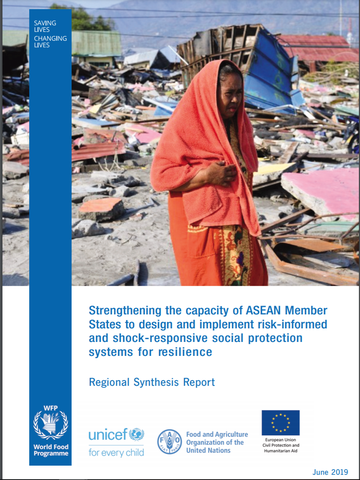
The complementarity of social protection and disaster risk management (DRM) is increasingly acknowledged by ASEAN. Accordingly, in this study, the overarching research question is: What factors enable social protection systems and programmes in ASEAN countries to be responsive to shocks and to deliver an effective response?
This research defines social protection as the set of public actions that address both the absolute deprivation and vulnerabilities of the poorest, as well as the needs of the currently non-poor for security in the face of shocks and lifecycle events. The rationale for shock-responsive social protection being given a front-line role in disaster response includes efficiency gains from faster responses, pooling of financial and programmatic resources, and speeding up decision making. Shock-responsive social protection also implies better preparedness for disaster response by improving the resilience of households facing shocks.
